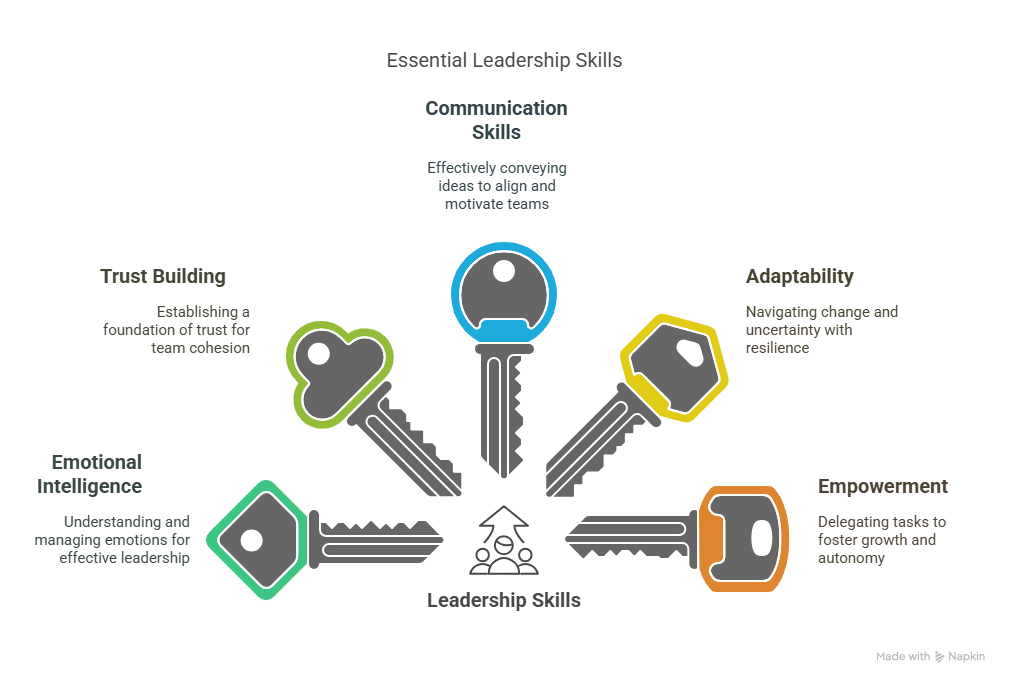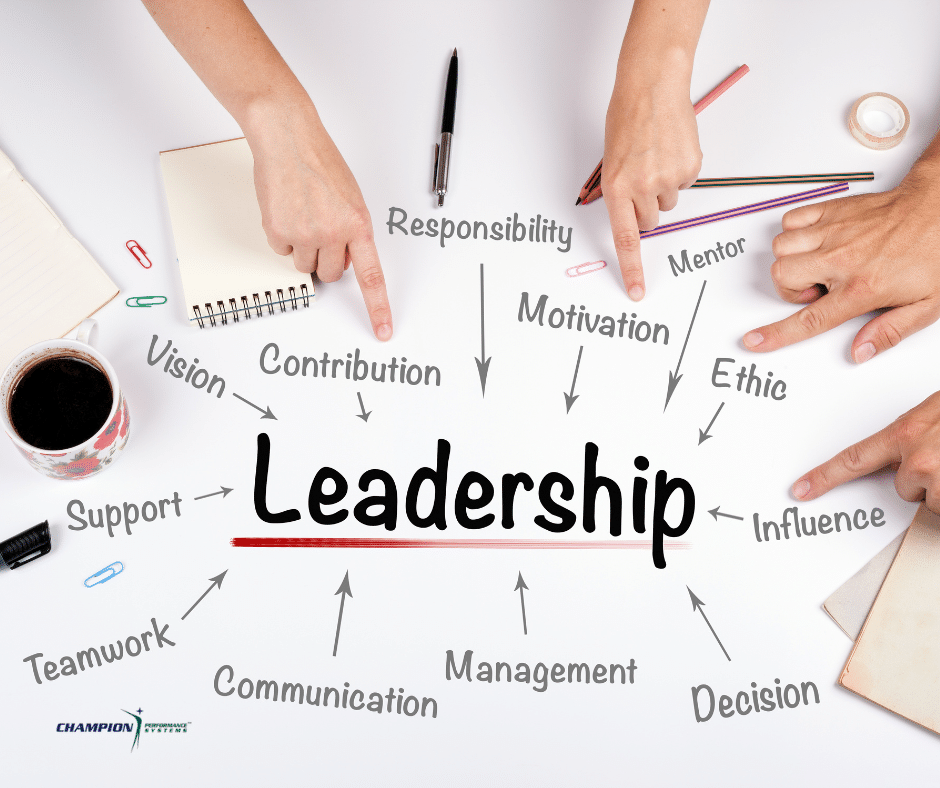Effective leadership skills in the workplace have become non-negotiable for building strong, high-performing teams. Whether you’re leading a small startup or a large corporation, having the right leadership skills can directly influence your team’s productivity, morale, and long-term success.
But what exactly are leadership skills, and how can you cultivate them? In this blog, we will explore five key leadership skills you need to develop to help your team reach excellence, as well as practical steps for how to improve leadership skills in the workplace.
Blog Highlights:
- Cultivating Emotional Intelligence for Stronger Leadership
- Building Trust: The Foundation of High-Performing Teams
- Communication Skills: Key to Aligning Teams and Driving Results
- Adaptability: Leading Through Change and Uncertainty
- Empowering Your Team: The Role of Delegation in Leadership

Cultivating Emotional Intelligence for Stronger Leadership
One of the most critical leadership skills in the workplace is emotional intelligence (EI). Emotional intelligence refers to your ability to recognize and manage your own emotions, as well as the emotions of others.
A leader with high emotional intelligence is able to connect with their team, understand their needs, and respond to challenges in a calm and empathetic manner.
Understanding Emotional Intelligence
Emotional intelligence consists of several key components: self-awareness, self-regulation, motivation, empathy, and social skills. Leaders with strong self-awareness can identify how their emotions impact their behavior and decision-making.
Those with self-regulation can control impulsive reactions and stay calm in stressful situations. Motivated leaders remain driven and inspire their teams, while empathetic leaders understand their team’s emotions and respond appropriately.
Why Emotional Intelligence is Crucial for Leaders
Leadership in the workplace requires navigating complex interpersonal dynamics, resolving conflicts, and motivating employees. Leaders who possess emotional intelligence can create a more harmonious and productive work environment.
For example, when a team is under pressure, an emotionally intelligent leader will remain composed, ensuring that the team stays focused and motivated. They will listen to concerns, provide support, and maintain an open line of communication.
In high-stress environments, leaders who demonstrate empathy and social awareness can build trust and loyalty, turning challenging situations into opportunities for growth. This ability to remain calm and understanding is what often distinguishes good leaders from great ones.
Emotional intelligence not only improves team dynamics but also contributes to better decision-making and conflict resolution.
Building Trust: The Foundation of High-Performing Teams
When it comes to good leadership skills in the workplace, trust is foundational. Without trust, teams struggle to collaborate, innovate, and achieve their goals. Building trust as a leader means showing integrity, consistency, and transparency in your actions and decisions.
Trust as a Cornerstone of Leadership
Trust is the bedrock upon which successful teams are built. When your team trusts you, they are more likely to be engaged, take initiative, and put in the effort necessary to meet team objectives.
Trust influences everything from how team members communicate with each other to how they collaborate on projects. It’s also key to employee retention; when employees trust their leader, they are more likely to stay with the company and feel invested in its mission.
Without trust, a leader can’t effectively motivate their team or foster open communication. Without trust, team members may withhold feedback or avoid taking risks, which stifles innovation. Conversely, when trust is established, leaders can provide constructive criticism, encourage creativity, and ensure that everyone is on the same page.
Practical Steps to Build Trust
So, how can you as a leader build trust within your team? One of the most effective ways is through consistency. When your team knows what to expect from you and sees that your actions align with your words, trust naturally develops.
Being transparent about decision-making processes and the reasons behind your choices helps eliminate ambiguity and shows your team that you value honesty.
Another important aspect of trust-building is following through on your commitments. When you say you will do something, ensure that you deliver. Trust is built over time through small, consistent actions that demonstrate your reliability.
Communication Skills: Key to Aligning Teams and Driving Results
Effective communication is one of the most important leadership skills in the workplace. Communication is how leaders share their vision, set expectations, and align their teams toward a common goal. Without clear, consistent communication, even the most capable team can become disconnected and unproductive.
The Power of Clear and Effective Communication
Leadership communication is not just about talking; it’s about ensuring your team understands the message, feels heard, and can contribute their own ideas. As a leader, you need to communicate your expectations clearly, whether you’re setting team goals or giving feedback on performance.
The ability to articulate your ideas in a concise and inspiring way is key to ensuring alignment and maintaining momentum within the team.
In addition to providing direction, effective communication also fosters trust and transparency. When you communicate openly, you create an environment where your team feels confident in their understanding of team priorities and project timelines. This minimizes confusion and reduces the likelihood of misunderstandings.
Enhancing Communication Within Teams
As a leader, your communication skills set the tone for your team’s overall communication culture. Encouraging active listening and providing regular feedback helps foster a team environment where everyone feels valued. When team members know they are heard, they are more likely to engage, contribute ideas, and collaborate effectively.
Consider implementing regular team meetings where team members have the opportunity to share updates, challenges, and successes. By creating a structured communication process, you allow your team to stay aligned and address issues before they escalate.
Adaptability: Leading Through Change and Uncertainty
In today’s rapidly changing business world, adaptability is one of the most important qualities a leader can have. Leadership in the workplace isn’t static—it requires a leader to adapt their approach, whether that means adjusting strategies, embracing new technology, or navigating periods of uncertainty.
The Role of Adaptability in Leadership
Adaptability is the ability to remain flexible and open-minded in the face of change. A leader who embraces change can pivot when necessary, reassess goals, and take proactive measures to steer the team through turbulent times.
Leaders who resist change or fail to adapt may find their teams stagnating, unable to respond effectively to challenges or new opportunities.
Adaptability also involves the willingness to continuously learn and grow. A leader who stays up to date on industry trends, seeks feedback, and embraces new ideas will inspire their team to do the same. This type of leadership encourages innovation and fosters a culture of continuous improvement.
Cultivating Adaptability as a Leader
To improve your adaptability, start by focusing on your mindset. Embrace challenges as opportunities to learn and grow. Stay open to feedback from your team, and be willing to change your strategies if something isn’t working.
As a leader, it’s important to lead by example—if you show your team that you are willing to adapt, they are more likely to do the same.
Being adaptable also means being comfortable with ambiguity and taking calculated risks. Leaders who thrive in uncertain environments are able to make decisions with limited information, empowering their teams to act decisively and confidently.
Empowering Your Team: The Role of Delegation in Leadership
Great leadership isn’t about doing everything yourself; it’s about empowering your team to take ownership of their work and thrive. Delegation is a powerful leadership skill that allows you to free up your time for higher-level tasks while enabling your team members to develop their skills and grow in their roles.
Why Delegation is a Key Leadership Skill
Delegation is crucial for creating a high-performing team. When you delegate tasks to the right people, you show that you trust them and value their abilities. This not only builds their confidence but also increases their engagement with the work.
By sharing responsibilities, you also prevent burnout and ensure that team members remain motivated and focused on their strengths.
Moreover, delegation fosters a sense of accountability. When your team members are responsible for specific tasks or projects, they take ownership of the outcome, which leads to better performance and results.
Best Practices for Delegating Effectively
Effective delegation requires understanding your team members’ strengths and aligning tasks with their skills. When assigning work, provide clear instructions and expectations. Check in periodically for updates, but avoid micromanaging—trust your team to complete the task on their own.
One of the biggest mistakes leaders make is failing to delegate enough. Delegating doesn’t just benefit your team; it also allows you to focus on leadership tasks that are more strategic, such as setting long-term goals and driving innovation.
Leadership Skills in the Workplace: Conclusion
Leadership skills in the workplace are essential for cultivating high-performing teams and driving business success. The five leadership skills we’ve covered—emotional intelligence, trust-building, communication, adaptability, and delegation—are foundational to effective leadership.
By developing these skills, leaders can motivate their teams, foster innovation, and create a positive work culture.
However, mastering leadership skills takes time and effort. A leadership coach can be an invaluable resource in guiding you through the process of enhancing these skills, providing feedback, and holding you accountable as you grow. Whether you’re looking to improve your emotional intelligence or learn how to delegate more effectively, a leadership coach can help you sharpen your abilities and achieve lasting success.
FAQs
What are good leadership skills in the workplace?
- Good leadership skills in the workplace include emotional intelligence, trust-building, clear communication, adaptability, and effective delegation. These skills enable leaders to motivate teams, navigate challenges, and drive performance.
What are leadership skills examples?
- Leadership skills examples include empathy, active listening, problem-solving, decision-making, and conflict resolution. These skills help leaders connect with their teams, address issues, and foster collaboration.
What qualities should a leader have?
- A leader should have qualities such as integrity, vision, emotional intelligence, adaptability, and the ability to empower others. These traits enable a leader to guide their team through challenges and inspire them to perform at their best.
What is the best leadership style?
- The best leadership style varies depending on the situation and the team. However, transformational leadership, which focuses on motivating and empowering employees to achieve their potential, is often considered highly effective for creating high-performing teams.
How can a leadership coach help me improve my leadership skills?
- A leadership coach can provide personalized guidance, feedback, and strategies to help you develop and refine your leadership skills. They offer valuable insights, hold you accountable, and help you navigate challenges to achieve greater success in your leadership journey.
If you’re ready to explore leadership coaching for your team, set up your FREE 30-min call with one of the best coaches in North America today!










